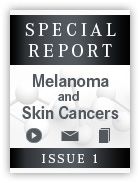Understanding the Biologic Pathways in Basal Cell Carcinoma
Most cases of BCC are curable with such approaches as surgery and radiation. In some cases, however, BCC can progress to a point of local invasion for which surgery and radiation therapy are not indicated.
The Hedgehog gene
Most cases of basal cell carcinoma (BCC) do not spread internally and are curable with such approaches as surgery and radiation. In some cases, however, BCC can progress to a point of local invasion for which surgery and radiation therapy are not indicated. Rarely, BCC can metastasize, a condition that is considered fatal. Until recently, few treatment options were available for patients with advanced BCC.1
Recent advances in the understanding of the biologic pathways that contribute to the progression of BCC have led to the development of therapies that directly target specific areas of these pathways.1,2
“The Hedgehog (Hh) signaling pathway is the important biologic pathway for driving all sorts of BCCs, whether it is advanced metastatic BCC or the common, uncomplicated BCCs on the skin,” said Jean Tang, MD, PhD, assistant professor of Medicine, Stanford University Medical Center. Tang has conducted several clinical trials in the development of novel therapies for patients with BCC that involve inhibition of the Hh signaling pathway.
Jean Tang, MD, PhD
One of the most common transduction pathways in mammalian cells, the Hh pathway plays a critical role in proper development during the embryonic period but is silenced in most adult tissues. However, it has been shown to promote stem cell proliferation from various adult tissues, including hematopoietic cells, mammary, mesenchymal, and neural stem cells. It also appears to be involved in the repair of adult organs following injury.2The Hh pathway was first described in 1980.3
Defects in the Hh signaling pathway have been associated with either overexpression of signaling molecules in tumors or cells within the tumor microenvironment, or in mutations in pathway genes. This leads to the progression of BCC as well as to resistance to chemotherapeutic agents.1,2
Virtually all patients with BCC have mutations in the Hh signaling pathway. These BCC tumors are associated with elevated Ptch and Gli1 messenger RNA levels.4,5This ligand-independent mechanism of Hh activation is referred to as type 1 Hb signaling.6Research has demonstrated that approximately 90% of BCCs have loss-of-function mutations in at least one allele of Ptch1. Furthermore, 10% have activating mutations in Smoothened (Smo) that render it resistant to inhibition by Ptch1.7-9Mutations in other downstream molecules of the Hh pathway are relatively rare in BCC.2
Medications that inhibit Smo have potential for producing significant clinical response in patients with advanced BCC. One agent is currently approved for use in advanced BCC, and several others are in clinical trials and are expected to further expand the therapeutic options for patients with advanced BCC.
References
- Cowey CL. Targeted therapy for advanced basal-cell carcinoma: vismodegib and beyond.Dermatol Ther (Heidelb). 2013;3:17-31.
- Macha MA, Batra SK, Ganti AK. Profile of vismodegib and its potential in the treatment of advanced basal cell carcinoma.Cancer Manag Res.2013;5:197-203.
- Nusslein-Volhard C, Wieschaus E, Mutations affecting segment number and polarity inDrosophila. Nature. 1980;287:795-801.
- Undén AB, Zaphiropoulos PG, Bruce K Toftgård R, Ståhle-BÓ“ckdahl M. Human patched (PTCH) mRNA is overexpressed consistently in tumor cells of both familial and sporadic basal cell carcinoma.Cancer Res.1997;57(12):2336-2340.
- Dahmane N, Lee J, Robins P, Heller P, Ruiz I, Altaba A. Activation of the transcription factor Gli1 and the Sonic hedgehog signaling pathway in skin tumours.Nature. 1997;389(6653):876-881.
- Scales SJ, de Sauvage FJ. Mechanisms of Hedgehog pathway activation in cancer and implications for therapy.Trends Pharmacol Sci.2009;30(6):303-312.
- Aszterbaum M, Rothman A, Johnson RL, et al. Identification of mutations in the human PATCHED gene in sporadic basal cell carcinomas and in patients with the basal cell nevus syndrome.J Invest Dermatol. 1998;110(6):885-888.
- Reifenberger J, Wolter M, Weber RG, et al. Missense mutations in SMOH in sporadic basal cell carcinomas of the skin and primitive neuroectodermal tumors of the central nervous system.Cancer Res. 1998;58(9):1798-1803.
- Epstein EH. Basal cell carcinoma: attack of the hedgehog.Nat Rev Cancer. 2008;8(10):743-754.
